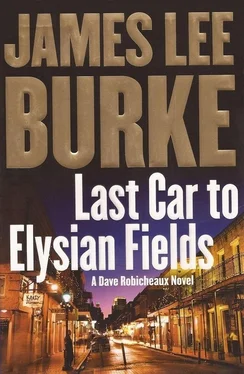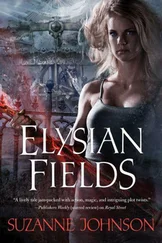She wore her shield on a black cord around her neck. The wind shifted, blowing across the barns and pastures of the horse farm where the Buick had burned. But the odor the wind carried was not of horses and alfalfa. Helen held a wadded-up piece of Kleenex to her nose, snuffing, as though she had a cold. Two firemen used the jaws-of-life to pry apart the window on the driver’s side of the Buick, then began pulling the remains of the driver out on the grass.
“The bus driver says the Buick was swinging all over the road?” I asked.
“Yep, they were having a grand time of it. Life on the bayou in 2002,” Helen said.
The water oaks along the Teche had already lost their leaves and their branches looked skeletal against the flattened, red glow of the sun on the western horizon. A spruce green Lincoln with two people in the front seat approached us from the direction of Loreauville, slowing in the dusk, pulling onto the shoulder. The driver got out, looking over the top of his automobile at the scene taking place by the fish pond, his face stenciled with a sadness that no cop, at least no decent one, ever wishes to deal with.
I reached through the open window of Helen’s cruiser and picked up a pair of polyethylene gloves and a vinyl garbage bag.
“Where you going?” she said.
“Litter patrol,” I replied.
I walked back along the road for two hundred yards or so, past a line of cedar trees that bordered another horse farm, then crossed the road to the opposite embankment where a spray of freshly thrown trash bloomed in the grass. I picked up chicken bones, half-eaten dinner rolls, soiled paper napkins, a splattered container of mashed potatoes and gravy, three blue plastic cups, three lids and straws, and broken pieces of a plastic wrap that had been used to seal the lids on the cups.
There were still grains of ice in the cups, along with the unmistakable smell of sugar, lemon juice, and rum. I found a paper sack and placed the cups and lids in it, then deposited the sack in the garbage bag.
When I got back to the accident scene, Helen was talking to the father and mother of the girl who had driven the Buick. The father’s face was dilated with rage as he pointed his finger at the drivers of both the truck and the church bus, both of whom had said his daughter was speeding and crossing the double-yellow stripe.
“Maybe you boxed her off, too. Why would she go off the left-hand embankment unless you wouldn’t let her back in line? Answer me that, goddammit,” he said.
An ambulance containing the bodies of the three girls was working its way around the other emergency vehicles, its flashers beating silently against the dusk.
I dropped the evidence bag in Helen’s cruiser and drove home, passing a rural black slum at the four corners, where several cars and pickup trucks were lined up at the service window of a drive-by daiquiri store.
Early the next morning, when the streets were still empty and the light was gray and streaked with mist in the backyards along the bayou, Fat Sammy Figorelli parked his Cadillac in front of my house, puffed on a cigarette while studying the live oaks and antebellum homes that lined East Main, then walked up on my gallery and began knocking so hard the walls shook.
“You mad at my door?” I said.
“I need to straighten you out about a certain issue,” he said.
I stepped outside, barefoot, still unshaved, dressed only in a T-shirt and khakis. He wore a rust-colored shirt and brown knit necktie and knife-creased slacks. He stood a half-head taller than I, his porcine face shiny with cologne.
“A little early, isn’t it?” I said.
“I get up at four every morning. I think sleep sucks,” he said.
“I see. Then you wake up other people. Makes sense.”
“What?” he said.
“Why are you here, Sammy?”
“I got this punk Gunner Ardoin calling me up, telling me he didn’t rat me out, that he’s got a little girl, that he can’t afford to lose work ‘cause he’s in the hospital.”
“Why tell me about it?” I asked.
“Thanks to you and that animal Purcel, my name is getting drug into all this.”
“Into what?”
“Stories about a priest getting bashed. I don’t want to hear my name coming up no more in regard to Father Jimmie Dolan. This guy is a world-class pain in the ass and I got nothing to do with him. What kind of priest punches out the owner of a health salon, anyway?”
“I hadn’t heard that one.”
“He probably left it out of his homily.”
“I’ll try to remember all this. Thanks for dropping by,” I said.
Sammy looked at me for a long time, his nostrils swelling with air, his small mouth a tight seam, as though he had been talking futilely to either a deaf or stupid man. A delivery truck smelling of donuts or freshly baked bread passed on the street. Fat Sammy watched the truck turn the corner by a huge, redbrick, tree-shaded antebellum home called the Shadows and disappear down a side street.
“This is a nice town,” he said.
I realized that whatever was really bothering him was probably not within his ability to explain. He watched a blue jay lighting on a bird feeder that hung from an oak limb in the yard. Then, like every mainstream American gangster I had ever known, almost all of whom struggle to hold onto some vestige of respectability, he unknowingly opened a tiny window into a childlike area of his soul.
“I talked with them German film people who’s doing a documentary. They say you told them I used to be on a first-name basis with a Miami guy who helped kill President Kennedy. It’s true, you told them people that?” he said.
“You know the same stories I do, Sammy. They just sound better coming from you. You were born for the screen, partner,” I said.
He seemed to think about my explanation, but showed no indication of wanting to leave my gallery.
“You care to come inside and have some coffee?” I said.
“Got any donuts?” he said.
I opened the door for him and watched his enormous bulk move past me into my house. I could smell an odor like testosterone ironed into his clothes.
That morning I drove to the high school that the three dead girls had attended up the bayou in the little town of Loreauville. The registrar gave me a copy of the yearbook from the previous year and I found the three girls’ photographs among members of the junior class. All three had been either class officers, prom queens, members of the drama club and speech team, or participants in Madrigals. They had been scheduled to graduate in the spring.
But one of the girls had a different kind of distinction. The driver, Lori Parks, had been on probation for possession of Ecstasy and had been driving with a restricted license for a previous DWI. By late afternoon the forensic chemist at our crime lab had matched a latent print from one of the plastic cups I had picked up two hundred yards from the crash site. The latent belonged to Lori Parks.
There is no open-container law in the State of Louisiana. It is supposedly illegal to drink and drive in the state, but a vendor can sell mixed drinks at drive-by windows to people in automobiles, provided the container is sealed. Wrapping a piece of plastic around the lid of a daiquiri cup satisfies the statute, and the passengers in the automobile are allowed to open the cups and consume any amount of alcohol they wish as long as they do not give alcohol to the driver.
If the driver is drinking and sees a state trooper or sheriff’s deputy hit his flasher, he only needs to hand his cup to a passenger and instantly he comes into compliance with the law.
The only person legally liable for any violation of the statutes governing the drive-by window sale of mixed drinks is the clerk who actually makes the sale, never the owner. Sometimes the clerk, who is usually paid no more than minimum wage, is fined or jailed or both for selling to underage customers. But the daiquiri windows remain open seven days and nights a week, positioned on each end of town, thriving on weekends and on all pay days.
Читать дальше












